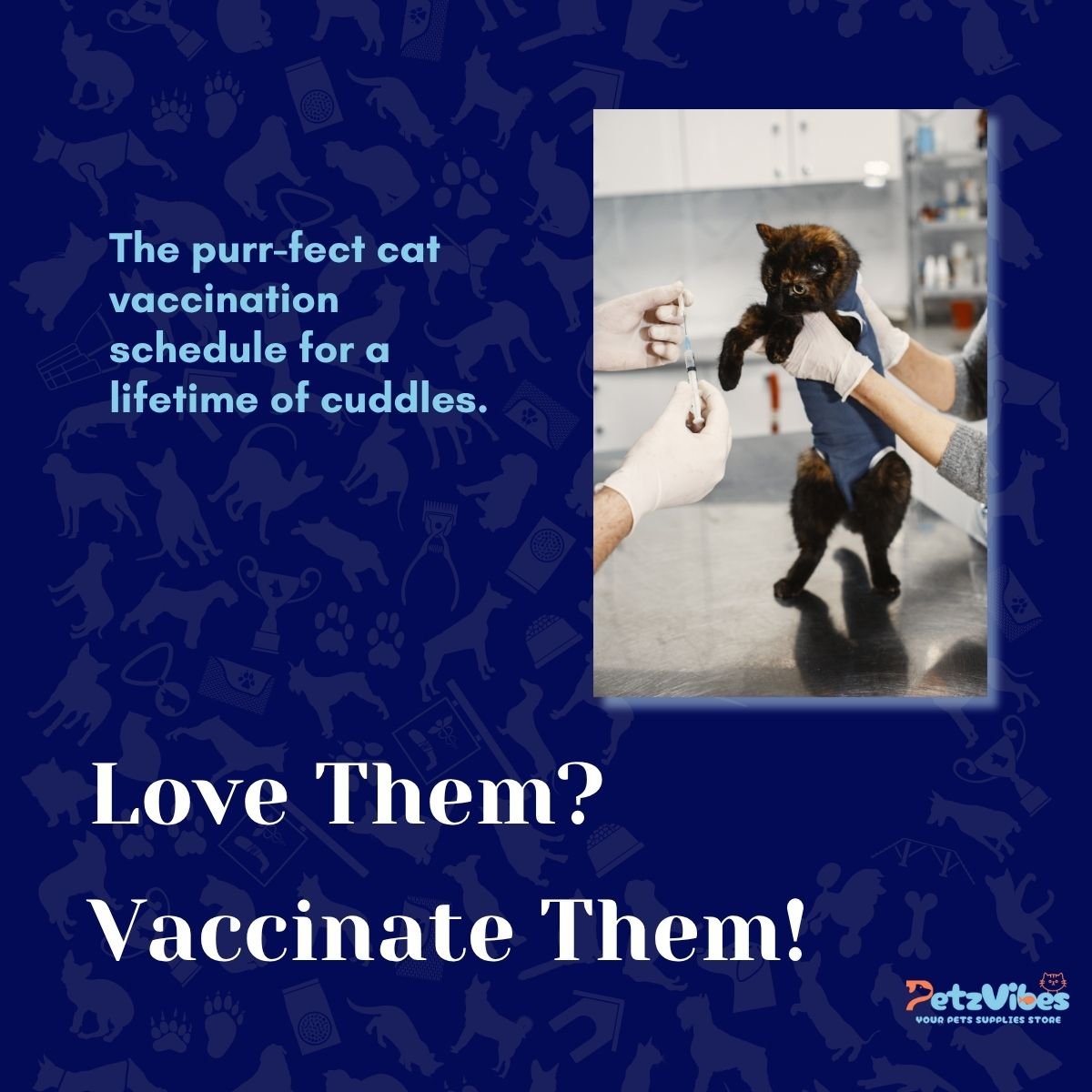Bringing a cat into your life means committing to their health; vaccinations are one of the most important ways to protect them. Whether you’re a new kitten parent or a seasoned cat owner, staying on top of your cat vaccination schedule ensures your furry friend avoids preventable diseases and enjoys a long, vibrant life.
But with so many vaccines available—core vs. non-core, kitten shots vs. boosters—it’s easy to feel overwhelmed. Which vaccines does your cat need? When should they get them? And what happens if you miss a dose?
In this guide, we’ll break down the essential cat vaccination schedule by age, lifestyle, and vet recommendations, so you can confidently make informed choices. Let’s dive in!
Why Vaccinations are Essential for Your Cat
Vaccinations are designed to protect cats from a variety of infectious diseases. By stimulating your cat’s immune system, vaccines prepare their body to fend off these threats if they ever encounter them. Keeping up with vaccinations is vital not only for your cat’s health but also for the broader cat population, as it reduces the spread of infectious diseases.
The Immune System and How Vaccines Work
The immune system is a complex network of cells and proteins that defend the body against infections. Vaccines introduce inactive or weakened forms of pathogens into the body, prompting the immune system to produce antibodies. These antibodies remain in the system to recognize and fight off future infections. Therefore, routine vaccinations are crucial to equip your cat’s immune system with the necessary defenses.
Common Cat Diseases Prevented by Vaccines
Cats are susceptible to several diseases that can lead to severe health complications. The most common ones prevented by vaccinations include:
- Feline Panleukopenia (FPV): Also known as feline distemper, this disease is caused by a highly contagious virus and can lead to severe vomiting, diarrhea, and even death.
- Feline Herpesvirus (FHV-1): This virus leads to respiratory infections, conjunctivitis, and may cause chronic illness.
- Feline Calicivirus (FCV): Causes respiratory infections, oral conditions, and sometimes more severe diseases.
- Rabies: A viral disease that affects animals and humans, causing central nervous system disorders, usually resulting in death once symptoms appear.
Core Vaccines for Cats
Core vaccines are essential for all cats, regardless of their lifestyle, as they protect against severe, widespread diseases.
Feline Viral Rhinotracheitis, Calicivirus, and Panleukopenia (FVRCP)
This vaccine is often called the “distemper shot” and combined into one injection. It protects against three highly contagious viruses:
- Feline Viral Rhinotracheitis (FVR): A severe upper respiratory infection caused by the feline herpesvirus.
- Calicivirus (C): Affects the respiratory system and oral cavity.
- Panleukopenia (P): Affects the intestinal tract, immune system, and sometimes nerve cells.
Rabies Vaccine
Rabies is a dangerous viral disease that affects mammals’ brains and nervous systems, including humans. Rabies vaccination is critical for your cat’s health and is often lawfully required in many regions. Keeping your cat vaccinated protects and minimizes the threat of rabies spreading to humans and other animals.
Non-Core Vaccines for Cats
Non-core vaccines are recommended based on your cat’s lifestyle and the potential risk of exposure to specific diseases. While not necessary for all cats, these vaccines can be crucial for others under certain conditions.
Feline Leukemia Virus (FeLV)
FeLV vaccination is strongly recommended for kittens and outdoor cats. FeLV can cause immunosuppression, anemia, and certain types of cancer. Cats exposed to other non-vaccinated felines, especially in multi-cat households or those that go outdoors, are at higher risk.
Feline Immunodeficiency Virus (FIV)
The FIV vaccine is optional and depends on your cat’s lifestyle. FIV affects the immune system, increasing the risk of other infections and diseases.
Bordetella
Bordetella is a bacterium that causes respiratory infections. This vaccine is generally recommended for cats in environments with high-density living conditions, such as shelters or catteries.
Chlamydophila Felis
This bacterium causes conjunctivitis and respiratory issues in cats. The vaccine is usually recommended for cats in multicat environments or where the disease is highly prevalent.
Vaccination Schedule for Cats
Understanding the appropriate vaccination timeline is key to ensuring your cat receives optimal protection. Kittens require a series of vaccinations followed by booster shots throughout their lives.
Kitten Vaccination Schedule
Multiple vaccinations are crucial during a kitten’s first few months due to their developing immune system.
| Age (Weeks) | Vaccine Type | Additional Notes |
|---|---|---|
| 6-8 | FVRCP | Initial core vaccination. |
| 9-12 | FVRCP, FeLV (optional) | FeLV is given if the kitten is at risk. |
| 12-16 | FVRCP, Rabies | Rabies is administered according to local regulations. |
| 14-16 | FeLV booster | As necessary, usually given when at risk. |
Adult Cat Vaccination Schedule
Once your cat reaches adulthood, maintaining vaccine boosters is essential to ensure ongoing protection.
| Vaccine Type | Frequency | Notes |
|---|---|---|
| FVRCP | Every 1-3 years | Follow the vet’s recommendations on the frequency. |
| Rabies | Annually or triennially | Based on the type of vaccine and legal requirements |
| FeLV (if at risk) | Annually | Recommended for cats with increased exposure risks. |
Preparing Your Cat for Vaccination
Preparing your cat for vaccinations can help reduce stress for both of you and ensure a smooth experience at the vet.
Before the Appointment
- Schedule Regular Check-ups: Regular vet visits help ensure vaccination schedules align with your cat’s health needs.
- Consult with Your Vet: Discuss any concerns about vaccinations or your cat’s health.
During the Appointment
- Stay Calm: Your cat can sense your feelings, and staying calm can help ease their anxiety.
- Use a Cat Carrier: Secure transportation is important for your cat’s safety.
After the Appointment
- Monitor for Adverse Reactions: Observe for lethargy, fever, or swelling at the injection site, and contact your vet if any severe reactions occur.
- Provide Comfort: Ensure your cat has a comfortable resting space after returning home.
Potential Side Effects of Vaccinations
Most vaccinations produce minor side effects, but it’s important to be aware of possible reactions to ensure your cat gets the appropriate care if needed.
Common Side Effects
- Mild fever
- Lethargy
- Loss of appetite
- Swelling or discomfort at the injection site
Rare Side Effects
- Allergic reactions
- Tumors at the injection site
- Limping or joint soreness
If your cat exhibits severe or prolonged symptoms, contact your veterinarian promptly for guidance.
The Cost of Cat Vaccinations
Vaccination costs can vary depending on region, specific veterinarian fees, and the type of vaccines required. However, the cost is a valuable investment in your cat’s long-term health, potentially preventing costly treatments for serious diseases later.
Budgeting for Vaccinations
Consider vaccination-related expenses as part of your annual pet care budget. It may include:
- Initial Vaccination Cycle: For kittens or new cats.
- Booster Shots: Scheduled based on the vaccine type.
- Veterinary Fees: Discuss the overall costs involved with your vet.
Maintaining Your Cat’s Health Beyond Vaccinations
Vaccinations are just a component of comprehensive feline healthcare. To keep your cat healthy, combine vaccinations with other preventive measures.
Regular Vet Check-ups
Consistent veterinary appointments assist with early detection of potential health issues and guidance on maintaining vaccinations appropriately.
Nutrition and Exercise
A balanced diet rich in nutrients and encouraging regular playtime are essential for overall health and infection resistance.
Parasite Prevention
Keep up with treatments to prevent fleas, ticks, and worms, which can contribute to health problems if unchecked.
Conclusion
A responsible cat owner must understand and adhere to a vaccination schedule. By ensuring that your feline companion receives necessary vaccines, you’re protecting their health and contributing to the safety of the broader community. With informed awareness and timely actions, you can ensure your beloved cat enjoys a long, healthy, and happy life.






